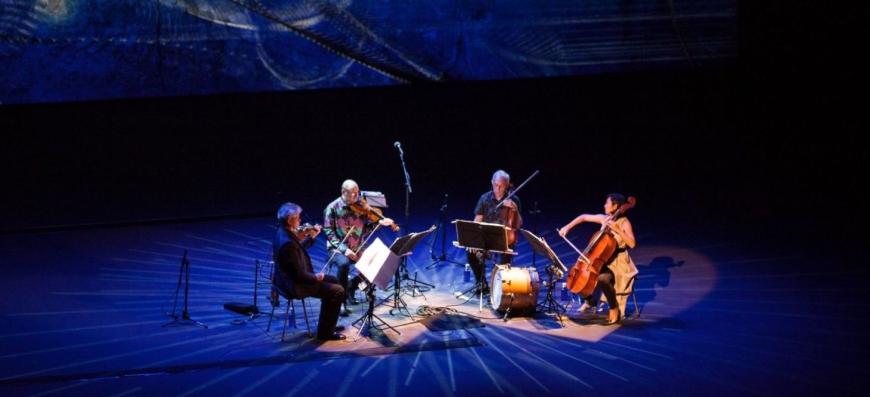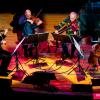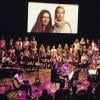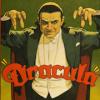
It’s no stretch to say that music for string quartet would look very different, toward the end of the 20th century, without the Kronos Quartet. Its performances and recordings in the 1980s and 1990s revivified an aging repertory, modeled a distinctly different approach to concert presentation, were inclusive long before the rest of classical music got on that train, and pioneered radical acts of collaboration with composers and other musicians — something that has become almost a default mode in contemporary classical.
Kronos has had direct influence on the quartets that came after, particularly those interested in new music, but as they approach their 50th anniversary (coming in 2023) it’s an institution as much as a concert-giving musical group. More than 900 works have been created for Kronos, many through its commissioning foundation, including the Fifty for the Future Initiative and the Under-30 Project for young composers. The quartet has sold more than 1.25 million units of their more than 70 albums, and, yes, there are the awards: two Grammys, a Diapason d’Or, an Edison Award, the Polar Music Prize, and many more.
The collaborations cross all kinds of boundaries and include Trio da Kali (from Mali), Laurie Anderson, Tom Waits, Joan Armatrading, David Bowie, Paul McCartney, Mexican rock band Café Tecuba, Astor Piazzolla, Allan Ginsburg, Alim Qasimov (an Azerbaijani singer), Bollywood singer Asha Bhosle and so many others it would be impossible to list them all.
Where to dive in, then, if you want to take a few drinks from the Kronos firehose? As frustrating as it is to say, “depends on your tastes,” that’s the best method with this group. The following list accounts for that by suggesting possibilities from distinctly different aesthetics, all of which Kronos has sought to represent. But each Kronos album is exciting in a slightly different way.
Kronos Quartet: Complete Landmark Sessions (compilation album)
This two-disc compilation represents a beginning for the quartet. Though violinist David Harrington founded the group in 1973, the core personnel (John Sherba, violin; Hank Dutt, viola; Joan Jeanrenaud, cello) didn’t come together until 1978, by which time the group was located in San Francisco in the first year of a residency at Mills College. They plowed through a raft of famous 20th-century repertory — Bartok, Prokofiev, Shostakovich, and such.
The group also had interests in other musical genres, playing an arrangement of Jimi Hendrix’s Purple Haze that became a staple encore of their early concerts. Still, it must have been a surprise when Kronos teamed up with producer Orrin Keepnews at Landmark Records to do two jazz albums, one of music by Thelonious Monk, and one of Bill Evans compositions. The arrangements, by Tom Darter, hold up pretty well and the presence of bassists Ron Carter on the Monk album and Eddie Gomez on the Evans gives the sound a little more depth and drive. It’s definitely worth a listen
Winter Was Hard (Nonesuch, 1988)
In 1985, Kronos signed on to Nonesuch Records and began putting out a series of albums that became famous precisely because the range of things the quartet was playing at the time was so broad that, as Harrington said of these recordings, “you never know what is going to happen next.” If you’re picking an album that represents this kitchen-sink approach, Winter Was Hard is the one. The title track by Aulis Sallinen is a choral song featuring the San Francisco Girls Chorus and reed organ in a piece that is mellifluous and beautiful. However, don’t get comfortable because Anton Webern’s Bagatelles for String Quartet (Op. 9) and John Zorn’s Forbidden Fruit (for voice, quartet, and turntables) are at the center of the album and Zorn is a “love him or hate him” kind of composer. I think this piece is inspired and it pairs well with Alfred Schnittke’s String Quartet No. 3, which the group also plays extremely well. The last big piece on the album is the original string quartet version of Samuel Barber’s Adagio for Strings. I think it’s beautifully done and well recorded. While some critics don’t like the performances of the Barber, Webern, or Arvo Pärt’s Fratres (here in an arrangement), that seems to be less important on this many-faceted album. With a repertory this wide, there are bound to be hits and misses.
Different Trains/Electric Counterpoint (Nonesuch, 1989)
Kronos’s first commission to Steve Reich resulted in one of the defining masterworks of the late 20th century. It calls for the quartet to dub multiple lines, so that four instruments become many, and recordings of interviews that the composer made with his old nanny, a retired Pullman porter, and survivors of the Holocaust are layered into the mix, while Reich also took the main musical motives from the speakers’ cadences and vocal inflections. It’s a brilliant piece that gets at a paradox of human experience: huge, terrible tragedies can be going on in one part of the world, but life goes on as normal elsewhere. Guitarist Pat Metheny plays Reich’s Electric Counterpoint on the B side of the album in a bravura, close to definitive, performance.
Different Trains is such a masterpiece that Kronos took it on tour, which required them to hire a sound designer to go with them. That led to the musicians hiring a lighting designer/visual effects designer, upending ideas of what a chamber music concert was or might be.
Black Angels (Nonesuch, 1990)
George Crumb’s bleak Vietnam War-inspired piece for electric string quartet is not supposed to sound “good.” It’s famous sound pictures of helicopters and the threnody weaving through it are so emotionally devastating that it took Harrington a lot of thought to figure out what would go next on the album. (In the event, it was an arrangement of Thomas Tallis’s motet Spem in alium.) All the other pieces on the album are about the horrors of war, including Dmitri Shostakovich’s String Quartet No. 8 in C Minor (1960), dedicated to the victims of fascism. It’s an intense album, but it is also Kronos’s finest album: hard to take, but brilliant all the way through.
Pieces of Africa (Nonesuch, 1991)
This is Kronos’s most popular album ever, with more than 400,000 copies sold. The achievement here is one of collaboration, always a Kronos strength. With the exception of South African Kevin Volans, whose quartet White Man Sleeps occupies most of the B side, the composer/musicians on this album had not written quartets or, in some cases, notated music before. It’s a trip through a few African musical styles at the hands of some of the continent’s most famous musicians of the time and Kronos’s job is to learn those styles and let them shine through. The music is transporting, but what we and the quartet take away from the experience is just a whole different way of making music for this ensemble. It’s an enriching, mind-opening album.
Astor Piazzolla: Five Tango Sensations (Nonesuch, 1991)
Some of the last Piazzolla performances are recorded on this EP, with Kronos providing backup. He brings the heat, and the music, commissioned by the quartet, flows easily. It may not be just dance music, but it’ll put a spring in your step.
Kronos Quartet Performs Philip Glass (Nonesuch, 1995)
Glass, like Reich, has created a number of works for Kronos, including a quartet based on music from his film score to Mishima, which featured Kronos. If you like Glass’s music, here are some of his most personal, deeply thought-out scores on one album, brilliantly played.
Early Music (Lachrymae Antiquae) (Nonesuch, 1998)
On this brilliant concept album, Kronos brings together actual medieval music, such as Perotin’s Viderunt omnes, and continuing through John Dowland’s Lachrymae pavanes, on which Kronos features Wu Man on the zhong ruan (similar to the Chinese pipa), but also expanding to include folk music and fiddling, and 20th -century music that is connected, by sound or concept, to older music. It’s a sound world that envelops you leads you to extraordinary connections through its careful sequence of pieces.
Landfall (Nonesuch, 2018)
OK, so we need at least one recording from outside of the “golden decade” when every Kronos album was a hit. Landfall, which won a 2019 Grammy, can be that album. Kronos’s collaboration with Laurie Anderson starts with reflections on Superstorm Sandy, which turned New York City and a good deal else into a disaster area. But Anderson, in her trademark narrative style weaves a much larger tale about loss, some of it emotional, some of it environmental. Electronics played an important role in the original stage show. The recording, obviously, can’t do complete justice to the show, but even as an album, it’s brilliant.






